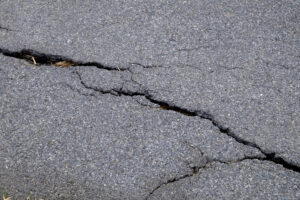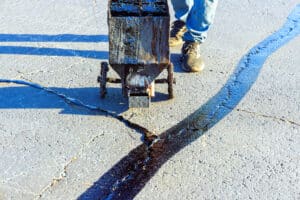Odds are you’ve experienced it several times in your life: You’re driving on the road, just enjoying a beautiful day, when wham! your car is rocked by a large pothole. You may have even blown a tire after an unfortunate encounter with one of these hazardous pavement craters.
What exactly are potholes? How do potholes form? Why should property managers in particular try to repair potholes in their parking lots ASAP? Let’s discuss the answers to these questions in more detail below.
What are potholes?
There’s no real mystery to what potholes are. According to one definition, a pothole is “a hole in a road surface that results from gradual damage caused by traffic and/or weather.” Pothole damage and ruts tend to form over time, and are especially prevalent in roads (and parking lots) that haven’t been properly designed or maintained.
Why do potholes form?
Potholes tend to form around weak areas in the road or parking lot. These weak areas may be a result of:
- Thin asphalt. When budget is an issue, the DOT or property manager may decide to only use the minimum asphalt thickness required to stay compliant with relevant codes. When the asphalt is thin, the road is generally weak.
- Drainage problems. When there’s not enough of a slope and/or runoff system for water to drain away, it will remain standing in one spot, and eventually drain under the asphalt’s surface. This, in turn, will lead to quicker erosion.
- Poor maintenance. When a road or parking lot is not maintained according to proper techniques, cracks in the asphalt can form as a result, leading to increased erosion from draining water.
- Mistreatment. The application of more pressure, weight, or force than the asphalt is designed for can eventually result in the formation of potholes. For instance, if a heavy truck or tractor drives over a certain part of the parking lot, its weight may bear down on the surface, thereby weakening the asphalt.
How do potholes form?
As far as the actual process goes, potholes are basically formed by water and gravity:
- First, water from rain or melted snow seeps into pavement through small cracks and rests underneath the upper pavement layer.
- During cold weather, freezing temperatures cause the liquid water to freeze and expand. The frozen ice pushes up on the road surface from underneath, causing the pavement to rise. This is called frost heave.
- When the temperature rises and the ice freezes again, an empty void is left under the pushed up pavement.
- Next, traffic from heavy vehicles passes over the expanded road surface, pushing down on the asphalt pavement. But, without the ice to support from underneath, the pavement collapses into the empty gap. The pavement breaks into pieces.
As the freeze thaw cycle naturally happens, this process repeats, with water flowing into more and more cracks in the roadway, full-blown potholes, and adjacent asphalt damage.
Late winter and early spring are referred to as pothole season because potholes abound at this time of year. Spring’s extreme cold and warm weather fluctuations wreak havoc on your pavement, making this season ripe for pothole formation.
Why should property managers have potholes repaired ASAP?
If you’re a property manager who’s responsible for a parking lot, why should you be concerned about the existence of potholes? Why should you seek to have them repaired as soon as possible? Here are just a few reasons why:
1. To Prevent Vehicle Damage
It’s true that drivers won’t be going through your parking lot at 60 mph (at least, they definitely shouldn’t be doing so). Nevertheless, any potholes in your lot could still result in significant damage to vehicles that enter, especially if the pothole is not clearly visible from all angles.
Here are just a few of the possible damages that could result from a vehicle hitting a pothole:
- Blown or punctured tires
- Suspension problems
- Loss of steering alignment
- Loosening of electrical cables
Obviously, you want to do whatever you can to prevent such damage to incoming and outgoing vehicles (and any liability you may bear as a result).
2. To Reduce the Risk of Injuries
Vehicle damage is not the only issue you should be concerned about. Remember, pedestrians have to walk across your pavement surface to get from Point A to Point B. If your lot is full of potholes, someone may trip on one and suffer a painful, injurious fall. This can be especially dangerous for seniors and persons with a disability.
3. To Avoid Congestion
No one in their right mind wants to deliberately drive over a pothole. The thing is, if your parking lot is full of potholes, it may result in increased traffic congestion as drivers maneuver around these road hazards. It may take longer for people to park their cars or exit the property, resulting in bottlenecks, increased frustration, and more incidents. Over time, your property’s reputation may even deteriorate to the point that drivers deliberately avoid your parking lot in favor of another one.
4. To Enhance the Property’s Value
It’s fairly obvious that potholes tend to decrease the value of a parking lot, as well as any adjacent building associated with that parking lot. If you ever plan on selling your property in the future, and want to get top dollar on the sale, then you’ll have to ensure that your entire property (including driveway and parking lot) is in the best possible condition.
5. To Investigate Underlying Issues
Potholes may be a symptom of a bigger problem, rather than the main problem itself. For instance, potholes may form if underground piping gets damaged, and begins to release water from underneath the parking lot’s surface. In that situation, fixing the potholes on the surface will only be a temporary patch at best. If a pothole gets repaired and then two more appear in quick succession, odds are you have bigger fish to fry — and you’ll need to address the underlying issue immediately.
Dealing with pavement cracks through regular maintenance is the best way to prevent potholes. However, if you already have a pothole problem or larger cracks, you’ll want to call in experts to handle it. At Superior Asphalt, LC, we offer a wide variety of asphalt repair and patching services — and we have the experience and expertise to rid your parking lot of potholes in no time at all. Contact us today to learn more.




